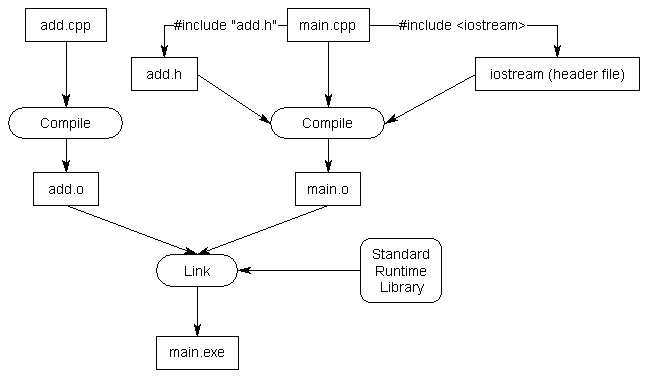lambda expressions
- capture clause (or lambda-introducer)
captures variables from the surrounding scope - parameter list (or lambda declarator; optional)
- mutable specification (optional)
allows to change captured variables - exception-specification (optional)
- trailing-return-type (optional)
normally automatically induced - lambda body

- anonymous functions that are used only locally (C++11)
- .. or more complicated (reference)
- lambda expression with empty captures can be bound to function pointers
- useful for setting constant variables
Copy
Copy to clipboad
Downlaod
Download
#include <iostream> // standard IO
#include <stdio.h> // for printf
#include <math.h> // math
#include <assert.h> // (`assert()' calls abort if arg not true)
using namespace std;
/** @brief function type definition
*/
typedef double (*FF_double_double)(double);
/** @brief Euler integrator
*/
double simpleIntegrate(FF_double_double integrand,
double lowerBound,
double upperBound)
{
assert(upperBound>lowerBound);
int nSteps = 10;
double x, deltaX = (upperBound-lowerBound)/nSteps;
double result = 0.0;
//
for (int iSteps=0; iSteps < nSteps; iSteps++)
{
x = lowerBound + (iSteps+0.5)*deltaX;
result += integrand(x)*deltaX;
}
return result;
}
/** @brief entry point
*/
int main()
{
double lowerBound = 0.0;
double upperBound = 1.0;
double result;
FF_double_double myFunction = // binding lambda expression to function pointer
[](double a){return 3.0*a*a;}; // lambda expresion
result = simpleIntegrate(myFunction,lowerBound,upperBound);
printf("integrating %18s from %5.2f to %5.2f yields: %12.8f\n\n",
"f(x)=3*x*x ", lowerBound, upperBound,result);
result = simpleIntegrate([](double a){return 6.0*a*(1.0-a);} // locally defined function
,lowerBound,upperBound);
printf("integrating %18s from %5.2f to %5.2f yields: %12.8f\n\n",
"f(x)=6*x*(1-x)", lowerBound, upperBound,result);
// constants, as needd for array delimiters, can be evaluated
// on the fly by lambda expressions
const int fibo5 = []() { // assigning const. variable to lambda expresssion
int a=1,b=1,c=0;
for (int i=0;i<5;i++) {c=a+b;a=b;b=c;}
return c;
}(); // () call lambda expression
printf("constant variable value: %4d : \n\n", fibo5);
// capture the counting variable by reference and do stuff with it
double rr=1.0;
for (int i=0; // for loop start statement
i<100; // for loop condition
[&i](){printf("%3d :",i);i++;}() // for loop loop-statement
)
{ rr = rr*0.999;} // for loop body
cout << endl;
return 1;
}
